7 Best Foods to Feed a Giant Breed Dog
| The Scoop : Best Giant Breed Food of 2025 | |||
| Rank | Product | Price | Rating |
| Human Grade |
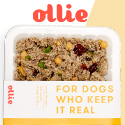 | Varies |
A+
|
| #1 |
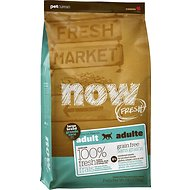 | $3.16/lb |
A+
|
| #2 |
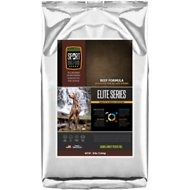 Sport Dog Food Elite Grain & Potato Free Large Breed Large Bites Beef Formula | $1.63/lb |
A
|
| #3 |
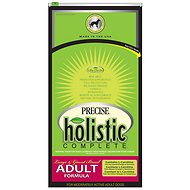 | $2.10/lb |
A
|
Quick Guide
If you believe that bigger is better then a giant breed dog might be right for you. Many of these huge dogs such as the Mastiff, Neapolitan Mastiff, Cane Corso, Dogue de Bordeaux, and others are descended from mastiff-type dogs and were used as war dogs in ancient times. Over the centuries they have adapted to a more peaceful lifestyle, guarding estates and farms. Other giant dogs, such as the Irish Wolfhound and Scottish Deerhound, are large sighthounds able to tackle deer and other large game. Whatever your preference, giant breed dogs need the best giant breed dog food you can give them.
Nutritional Needs for a Giant Breed Dog
While all dogs need basic nutrients such as protein, fat, carbohydrates, fiber, vitamins, and minerals, giant breeds do have some particular nutritional requirements. You will no doubt quickly discover that most dog food companies combine large and giant breed foods together. Most companies consider any dog that will weigh more than about 50 pounds as an adult a “large/giant” breed. While this can be somewhat annoying if you have a Retriever that weighs 70 pounds or a Great Dane that weighs 180 pounds because of the enormous weight difference between the two breeds, dog food companies don’t seem to see any need to distinguish between big dogs.
You will also discover that, compared to Toy breeds, small dogs, and medium-sized dogs, there are relatively few dog foods made just for giant breed dogs. For example, if you check Chewy.com, perhaps the largest online pet food retailer, for dry dog foods, you will find 212 foods for Extra Small & Toy breeds; 1156 foods for Large breeds; 1030 foods for Medium breeds; and 1236 foods for Small breeds. Yet there are only 144 dog foods made specifically for Giant breeds. Even this is somewhat deceiving if you check out these foods. Most of the 144 foods don’t state that they are made especially for giant breeds. Instead, most of them are made for large breeds.
For these reasons, it can be difficult to find good dog foods made especially for giant breed dogs. You may need to buy a food that’s labeled for large breed dogs. It would be nice if canine nutritionists and dog food companies devoted more attention to the needs to giant breeds but until they do you will need to check foods carefully to make sure they have the nutrients your giant dog or puppy needs. One recent improvement is that AAFCO now requires companies to state whether their foods for growth/all life stages are suitable for puppies that will mature to be larger than 70 pounds. This is because new research found that the previous maximum amount of calcium in these foods were dangerously high for large and giant breed puppies – who need less calcium than other puppies. Large and giant breed puppies are more sensitive to too much or too little calcium while they are growing, so it’s important to look for a puppy food that is formulated to meet this need.
Puppies
If your puppy will be close to 70 pounds as an adult – or more than 70 pounds – it’s important for you to look for a puppy food that has the following nutritional adequacy statement:
[Pet Food Name] is formulated to meet the nutritional levels established by the AAFCO Dog Food Nutrient Profiles for growth/all life stages including growth of large-size dogs (70 lbs or more as an adult).
Other puppy foods will say something like this instead: “for growth/all life stages except for growth of large-size dogs (70 lbs or more as an adult).” Do not feed this kind of puppy food to your giant breed puppy. It won’t meet his nutritional needs.
It’s very important that you feed your giant breed puppy a food that is formulated for his growth. Giant breed puppies can have rapid growth spurts but they have a narrow range of calcium requirements. Many giant breeds are subject to developmental orthopedic diseases (DOD) such as osteochondrosis and osteochondrosis dissecans (OCD). Too much or too little calcium in their diet and your puppy can have a serious bone disease that could affect him permanently. Panosteitis (pano) and hypertrophic osteodrystrophy (HOD) can also occur in some giant breed puppies. Rapid growth in these big puppies can lead to later problems such as hip and elbow dysplasia or arthritis.
We also caution you not to add any supplements to your giant breed puppy’s diet such as multivitamins, cottage cheese, yogurt, or other food additives. If you are feeding your puppy a food that is complete and balanced for giant breed puppies, adding supplements to it can throw off the nutritional balance. This can lead to nutrient excesses for your puppy which can result in bone or other health problems. So, no supplements or additives while your puppy is eating a giant breed puppy food.
While more research needs to be done on the nutritional needs of giant breeds and giant breed puppies, what’s clear so far is that these puppies should be encouraged to grow slowly. It takes a long time for their bones to develop and for their growth plates to close. Some giant breed puppies continue to grow for more than two years. If they are fed too much too early, or given foods with the wrong nutrients, you can expect your giant breed puppy to have skeletal and joint issues later in life.
Free feeding giant breed puppies has also been linked to developmental orthopedic diseases (DOD). If you have a giant breed puppy it’s important to measure his food portions and regulate how much you feed him in several small meals per day.
Adults
Giant breed adult dog foods typically have fewer calories than other adult dog foods. This is because, as a rule, the bigger the dog, the slower their metabolism works. While tiny Toy breeds need about 40 calories per pound per day, giant breed dogs only require about 20 calories per pound per day. Because of their size, it’s very important for these big dogs to stay slim. Many of these breeds are prone to hip and joint disease so carrying any excess weight can increase the risk of your dog developing arthritis or hip dysplasia as he gets older.
Giant breed dog foods may also be less nutrient-dense than adult foods for other adult dogs – by design. Many giant breeds continue to grow well past one or two years of age. They may look big to many people, but they aren’t yet fully grown. You should talk to a good breeder or a breed expert about the best time to switch a giant breed puppy to an adult food. In some cases, giant breed dogs are not fully grown until they are 3-4 years old. For example, a Bernese Mountain Dog is not usually full-grown until he is about 3 years old. You probably won’t feed a puppy food for 3 years but you will want to feed a good giant breed adult food.
As with large breed dog foods, foods made for adult giant breed dogs often include supplements such as glucosamine, chondroitin, green-lipped mussels, SAM-e, and other ingredients which are believed to help reduce or prevent bone and joint problems. Whether these supplements really work or not has not been scientifically proven but many owners believe they help their dogs. Most dog foods contain only small amounts of these supplements, however. If your dog has arthritis or another joint problem, it’s a good idea to talk to your veterinarian. You can also find many supplements online and at your local pharmacy.
Some giant breeds can be prone to bloat. Bloat, or gastric dilatation and volvulus, is a life-threatening condition that involves the stomach filling with air or fluid and twisting. This cuts off the blood supply to the stomach and intestines which leads to shock and then death. Bloat is an emergency. You should get your dog to the vet immediately when you see the signs. There are no specific foods to feed a dog to avoid bloat, though feeding a good quality dog food is recommended. Other suggestions include:
- Avoid foods that have fat or oil as one of the first four ingredients.
- Choose foods with larger kibble sizes.
- Don’t let your dog exercise strenuously for 1-2 hours after eating.
- Don’t mix dry food and water together.
- Don’t use a raised feeder or stand.
- Feed your giant breed dog several smaller meals instead of one big meal per day.
- Use a slow feed bowl to encourage your dog to eat more slowly so he won’t gulp down air while he’s eating.
What to Look For in a Good Giant Breed Dog Food
In terms of looking for good quality ingredients, choosing a giant breed dog food is no different than choosing any other dog food. However, there are some differences.
Protein – At one time there was a belief that large and giant breed puppies and dogs needed to limit their consumption of protein. It was thought that protein might be connected to the bone and joint problems these dogs sometimes experienced. Actually, bone and joint problems for bigger dogs are usually associated with excess minerals or mineral imbalances or too many calories (i.e., too much fat). Research has shown that it’s not protein but obesity and calcium levels which contribute to bone and joint problems. AAFCO recommends a minimum of 18 percent protein in the diet for adult dogs; and 22 percent protein in a growth and reproduction diet. Most dog foods today exceed these percentages. There doesn’t seem to be any reason to restrict your giant breed dog’s protein when you feed a good quality dog food. Likewise, protein should not be a problem in giant breed puppy foods. A dry matter protein percentage of 30 percent is perfectly fine for many giant breed puppies.
Fat – While giant breed dogs and puppies can eat protein in good quality dog food like other dogs, they do need to be mindful of calories. More than other dogs, if you have a giant breed you need to be concerned about your dog’s weight. Carrying any extra weight can increase the risk for your dog to have bone and joint problems. Giant breeds have a slower metabolism than other dogs so they don’t need as many calories per day. Most giant breed dog foods have slightly fewer calories than other dog foods. They are formulated for your big dog’s needs and they can help him stay slim. AAFCO recommends that adult dogs have a minimum of 5 percent fat in their diet for maintenance; growth and reproduction diets should have a minimum of 8 percent. Most dog foods today far exceed these percentages. Giant breed dog foods usually have higher fat percentages than these amounts but you shouldn’t feed your big dog food that has too much fat. A dry matter basis percentage of 9 percent is good for many giant breed puppies.
Calcium – Giant breed dogs and puppies do need to have foods that have had their calcium levels lowered. Many people think that since these are big dogs and they often grow for a long time that they need more calcium. In fact, the opposite is true. Too much calcium for a giant breed puppy can lead to bone problems such as osteochondrosis dissecans (OCD) and other developmental diseases. Researchers recommend that you look for a dry matter calcium percentage of 1.5 percent. The calcium:phosphorus ration should be between 1:1 and 1.3:1 for giant breed puppies.
Puppies: no supplements, please – Please don’t add any supplements to your giant breed puppy’s diet. No yogurt, cottage cheese, multivitamins, or other things. Your puppy’s food should be “complete and balanced.” If you add things to it, it won’t be. Giant breed puppies are particularly sensitive to certain levels of vitamins and minerals. When you add supplements to his diet, you risk throwing his growth out of balance which can lead to disease in both the short and long term.
Adults: glucosamine and chondroitin – Adult giant breed dogs may benefit from foods that have supplements such as glucosamine and chondroitin added – though the science is not settled. Dog food companies usually mention on the label if the food includes these supplements though the FDA does not allow them to make any serious health claims about them.
AAFCO – There are currently no guidelines or regulations for adult giant breed dog foods from AAFCO. AAFCO does require dog foods that are labeled for “growth” (i.e., puppy foods) to state whether they comply with new regulations for large and giant breed puppies about calcium levels. Look for this nutritional adequacy statement when buying puppy food for your giant breed puppy.
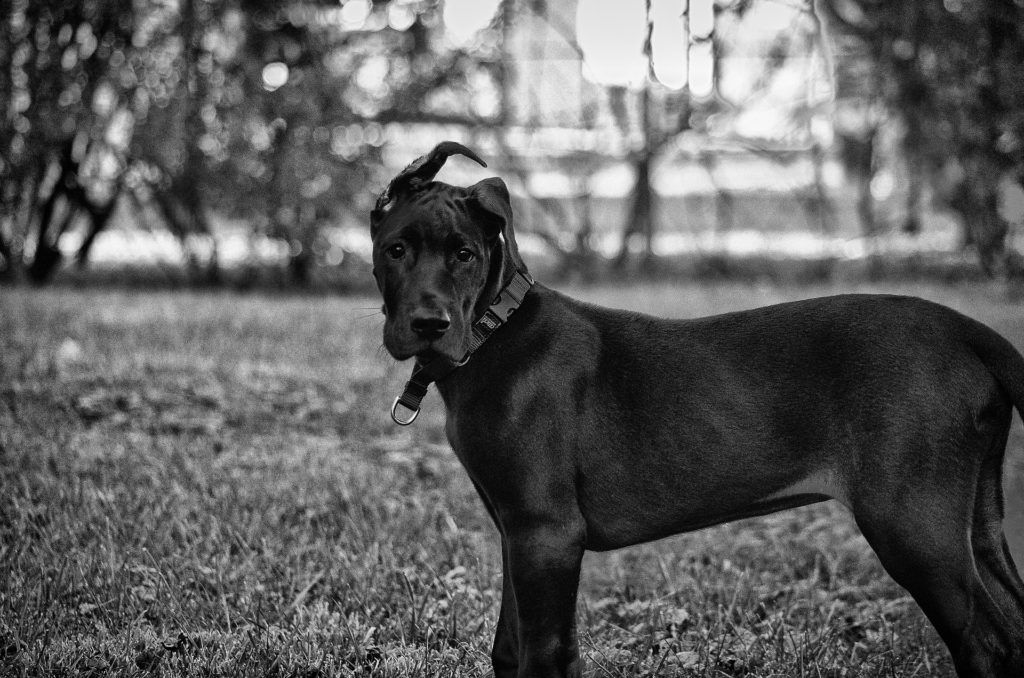
3 Best Giant Breed Adult Foods
| Rank | Product | Price | Rating |
| Human Grade |
 | Varies |
A+
|
| #1 |
 | $3.16/lb |
A+
|
| #2 |
 Sport Dog Food Elite Grain & Potato Free Large Breed Large Bites Beef Formula | $1.63/lb |
A
|
| #3 |
 | $2.10/lb |
A
|
Now Fresh Grain Free Large Breed Adult Recipe
First 5 Ingredients : De-Boned Turkey, Whole Dried Egg, Potatoes, Peas, Potato Flour

Now Fresh Grain Free Large Breed Adult uses 100 percent fresh turkey, salmon, and duck. It has 363 kcal/cup. The food has no grains, wheat, beef, corn, or soy, so it can also be a good choice for dogs with allergies or food sensitivities. The food includes supplements for good hip and joint health. This food can be a good choice for giant breed dogs that are less active and don’t need as many calories.
Sport Dog Food Elite Grain & Potato Free Large Breed Large Bites Beef Formula
First 5 Ingredients : Beef Meal, Yams, Freeze Dried Sweet Potato, Freeze Dried Beef Liver, Freeze Dried Pumpkin

Cooked with low heat then sprayed with salmon oil, herring oil, probiotics, and freeze-dried proteins, and other ingredients, this food is grain free, white potato-free, and pea-free. No corn, wheat, soy, or gluten. No chicken, rice, or eggs. It has a single source of protein – beef – which reduces the chance of allergic reactions. Optimum levels of calcium and phosphorus are perfect for large and giant breeds. This food has 30 percent protein, 14 percent fat, and 454 kcal/cup. It has 32 percent carbohydrates. This would be a great food for an active giant breed dog.
Precise Holistic Complete Large & Giant Breed Adult
First 5 Ingredients : Chicken, Chicken Meal, Ground Brown Rice, Oatmeal, Chicken Fat (Preserved with Mixed Tocopherols and Ascorbyl Palmitate)

Precise Holistic Complete Large & Giant Breed Adult formula has triple proteins and the calcium and phosphorus levels have been adjusted for large and giant breed adult dogs. The first five ingredients are: chicken, chicken meal, ground brown rice, oatmeal, and chicken fat (preserved with mixed tocopherols and ascorbyl palmitate). This food has moderate protein and fat with slightly more calories per cup than some large/giant breed foods (417 kcal/cup).
4 Best Giant Breed Puppy Foods
| Rank | Product | Price | Rating |
| #1 |
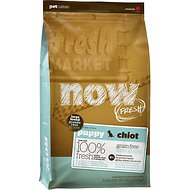 | $3.16/lb |
A+
|
| #2 |
 | $2.00/lb |
A
|
| #3 |
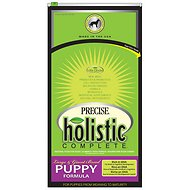 | $2.00/lb |
A
|
| #4 |
 | $1.33/lb |
A-
|
Now Fresh Large Breed Grain Free Puppy
First 5 Ingredients : De-Boned Turkey, Whole Dried Egg, Potatoes, Peas, Potato Flour

Now Fresh Large Breed Puppy food is made with 100 percent fresh turkey, salmon, and duck. It also has fresh omega 3 and 6 oils, no grains, gluten, wheat, beef, corn or soy. It also has no rendered meats, by-products or artificial preservatives. It has the right calcium and phosphorus levels for your giant breed puppy; and green mussels for hip and joint health. Plus, it has plenty of protein and modest fat levels for your puppy, with 379 kcal/cup. We think this is a good food for giant breed puppies.
Holistic Select Large & Giant Breed Puppy Health
First 5 Ingredients : Lamb Meal, Ground Brown Rice, Ground White Rice, Chicken Meal, Dried Beet Pulp

Holistic Select Large & Giant Breed Puppy Health comes in a lamb and oatmeal recipe. It also includes chicken and fish and it has DHA for brain and eye development. The first five ingredients in the food are: lamb meal, ground brown rice, ground white rice, chicken meal, and dried beet pulp. The food has 23 percent crude protein and 12 percent crude fat with 375 kcal/cup. These lower percentages and calories encourage slow growth in giant puppies. Holistic Select has several good kibble and canned foods including other large and giant breed foods.
Precise Holistic Complete Large & Giant Breed Puppy
First 5 Ingredients : Chicken, Chicken Meal, Ground Brown Rice, Oatmeal, Lamb Meal

Precise Holistic Complete Large & Giant Breed Puppy has 400 kcal/cup, 23 percent crude protein, and 12 percent crude fat. The first five ingredients in this food are: chicken, chicken meal, ground brown rice, oatmeal, and lamb meal. It has three kinds of protein for your growing puppy with the right calcium:phosphorus balance. Precise has a good reputation for making large and giant breed foods. You may also be interested in Precise Naturals Large & Giant Breed Puppy Formula Dry Dog Food.
Eagle Pack Large & Giant Breed Puppy
First 5 Ingredients : Lamb Meal, Oatmeal, Ground Brown Rice, Dehulled Barley, Rice

Eagle Pack Large & Giant Breed Puppy features lamb and chicken meals as protein for your giant breed puppy along with controlled calories and balanced mineral levels. The first five ingredients are: lamb meal, oatmeal, ground brown rice, dehulled barley, and rice. The food has 23 percent crude protein and 12 percent crude fat, with 330 kcal/cup. No corn, wheat, meat or poultry by-products, artificial colors, flavors, or preservatives.
Conclusion
Giant breed dogs and puppies probably surprise many people because they don’t eat as much food as you might expect. They eat fewer calories per pound of body weight than smaller dogs and they have slower metabolisms. It also takes giant breed puppies a long time to mature. Let your puppy grow slowly and don’t try to fatten him up. Feed your giant breed dog a good quality food with good protein and pay close attention to the minerals and other nutrients in the food. Keep the calories moderate for both puppies and adult dogs. And remember that you shouldn’t add any supplements or toppings to your giant breed puppy’s food or you could throw his vitamins and minerals out of balance.
We hope the information provided here is helpful for you. If you need more recommendations about the best foods for your dog, check our reviews here on Pawster!












i just got a Grate Dane puppy to use as a service dog. i want to feed Duke the best i can feed.